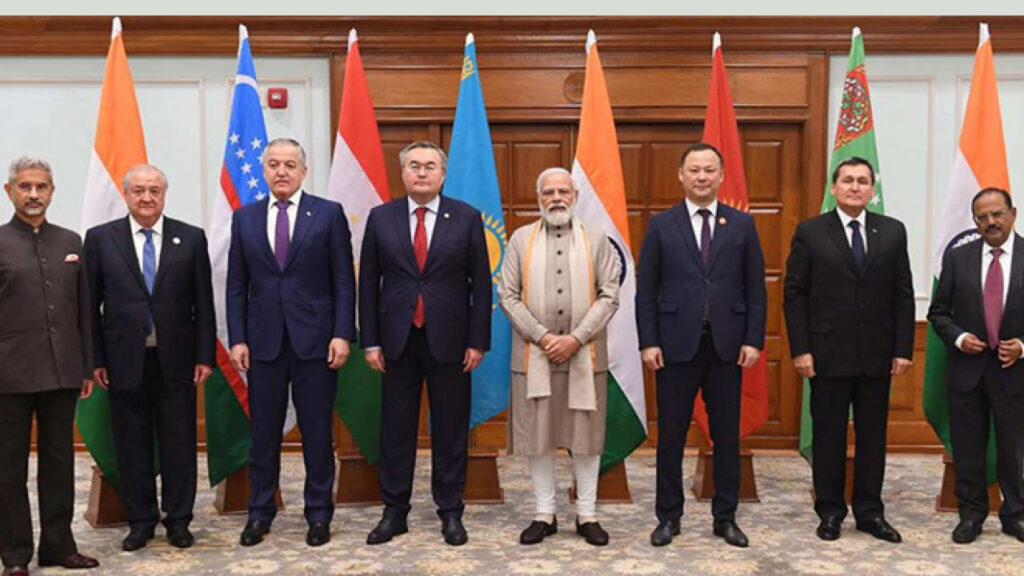Amb Anil Trigunayat
India’s rise on the global landscape has been nothing short of remarkable. It has expanded its economic and political reach across international borders and has created lasting partnerships with a number of important trade and political players. With India’s population and demographic dividend justovertaking China, the country wants to expand global partnerships with the aim of securing new engines for economic growth and maintaining stability in the long-term.
It is in this context that India spent the past decade trying to expand its interests through soft power and economic cooperation into regions where it was historically not present, such as Central Asia, a region that has recently shown signs of economic and political awakening. India’s Neighbourhood First, Act East, Link West and Connect Central Asia initiatives are all key links in that chain. Today,India is a strategic partner of all Central Asian countries, and security and safety of the region is central to our dynamic interactions.
By pursuing the Connect Central Asia policy, and with the aim of establishing deeper economic and cultural ties in the region, India has tried to access the Central Asian markets for years. After witnessing rapid changes that occurred in the region with US exit and onset of Taliban in Afghanistan, the pandemic and after Russia invaded Ukraine, India’s policy has acquired a new agency for realignment and securing her extended neighbourhood. As evidenced by the India-Central Asia Summit, which was presided over by Prime Minister Narendra Modi in January 2022, India is eager to play a more proactive economic and political role in this part of the world. Indian External Affairs Minister Dr. S Jaishankar met all five of his counterparts bilaterally and jointly, and highlighted the need to work on 4Cs: commerce, capacity enhancement, connectivity, and contact. This will further consolidate India’s presence in this region.
Understanding the importance of constructive diplomacy, India has ramped up its efforts to engage with Central Asia through various means, including hosting the first-ever India-Central Asia meeting of national security advisors in New Delhi in December 2022 especially in the context of Afghanistan. Later this year India will be hosting the SCO Summit in which several Central Asian leaders will have yet another interactive opportunity with the Indian Prime Minister.This shows that India not only sees the region as a fertile ground for investments and trade, but that it understands how strategic security partnerships far from its borders can help it secure national security interests in its own region.
With a great focus on Made in India and a focus on the manufacturing industry,India also sees Central Asia as a long-term partner in energy and natural resources. While Connectivity remains the key goal, the ‘digital bridge’ is already evident. India has also extended a Line of Credit of US$ 1bn to the Central Asian Countries to enhance trade, investment and capacity building partnerships with priority development projects in energy, healthcare, connectivity, IT, agriculture, education and other areas.However, the region faces crises that may have limited India’s ambitions and capabilities in the short-term. The ongoing conflict in Ukraine, inflation, and food insecurity are just a few examples of the challenges that Central Asia must address before unleashing its full potential.
Additionally, the region is caught in a new tug of war between China and the US and Turkey reasserting itself especially as Russia’s influence wanes. The geopolitical ramifications of this seismic shift are still being realised even as Central Asian countries are looking for new avenues and partnerships. Recently, the region has also been the subject of a Western PR push, with visits from US Secretary of State Antony Blinken and FCDO Minister, James Cleverly. The Chinese side has instead focused on a renewed economic push, adding new flights and investing in Middle Corridor’s rail networks, a trade corridor that China believes is strategically important for strengthening its economic and trade influence over Europe.
To continue establishing itself as a reliable partner, India must strengthen its links with Central Asia through trade, investment, and transport. Summits like the recently announced Astana International Forum (June 2023), envisioned as a new global platform for dialogue and cooperation, will play a crucial role in enabling this. They provide opportunities for countries to build up partnerships and investment at all levels, and to discuss some of the most pressing issues of today, from global security challenges to solving climate change and pollution.Prestigious forums like this will allow India to directly showcase its potential and determination to act as a credible partner on the international scene. This builds on India’s own work in this area, such as through emerging as a Voice of the Global South.India held a Summit for this initiative earlier this year in January 2023, and it was attended by all Central Asian countries.
Looking ahead, the G20 Summit that India will host in New Delhi in September presents another opportunity for the country to expand its global partnerships beyond its traditional regions of interest. As the war in Ukraine enters its second year, the erosion of multilateralism and re-emergence of global food and energy crisis poses the threat to the most vulnerable countries and populations. The Constructive G20 agenda put forward by India with ‘VasudhaivKutumbakam ‘ – One earth, One Family, One Future -could instead help create the necessary groundwork for the revival of international dialogue and return to peace.
Only by continuing to engage on this level internationally will India be able to further reinforce a more positive stature and benign power image abroad. In doing so, it will not only expand its economic interests in new regions but play a more prominent role in mediating great power competition while advancing humane solutions to some of today’s most pressing issues and challenges.
Source: financialexpress


